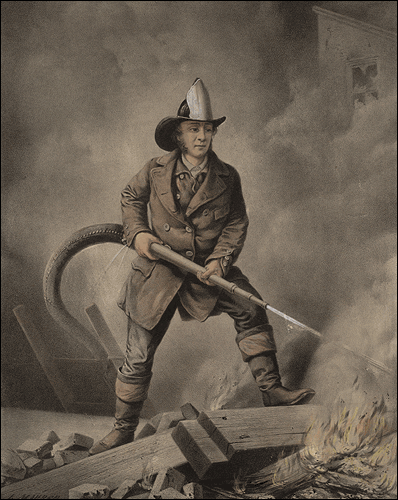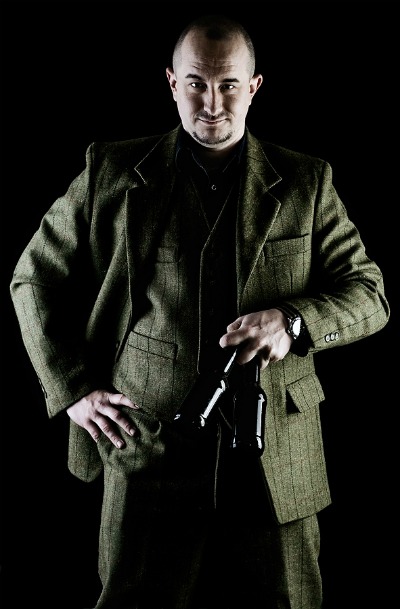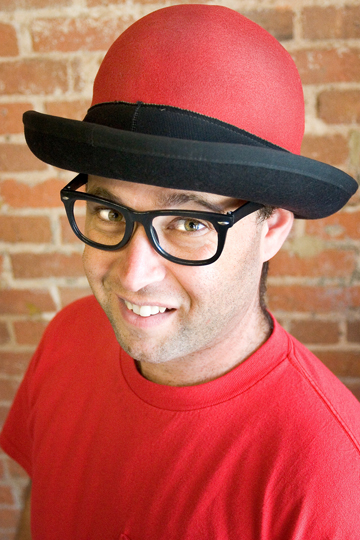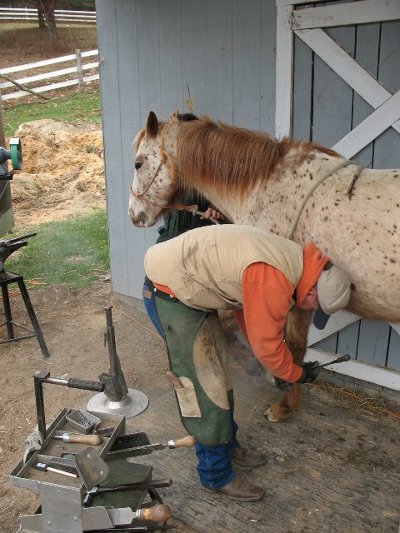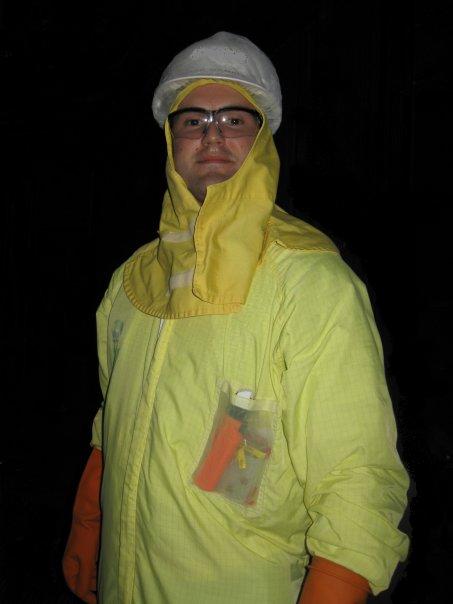
Today we return to our “So You Want My Job” series, in which we interview men who are employed in desirable man jobs and ask them about the reality of their work and for advice on how men can finally become what they always wanted to be when they grew up.
For this installment, we interviewed Jack Gamble. Jack’s a nuclear system engineer. Many thanks to Jack and his green-glowing fingers for typing us out these answers.
1. Tell us a little about yourself (Where are you from? Where did you go to school? How old are you? Describe your job and how long you’ve been at it).
I am 28 years old from Manahawkin, New Jersey. I earned my Bachelors Degree in Mechanical Engineering from Rowan University in 2005. Most of my work experience has been blue collar; pool installation and commercial fishing, making this my second “real job” as they say.
I am a System Engineer at a nuclear power plant. I am better known as The Control Rod Drive (CRD) System Manager. In a nutshell, I am responsible for monitoring and maintaining the ability to safely and quickly shutdown the reactor. There is no system more important to safety than CRD and, as such, I take great pride and painstaking care to ensure that I do my job to the best of my ability.
My average day consists of monitoring system performance data (pressures, hydraulic flows, temperatures, etc.) and digesting this myriad of information to paint a picture of the condition of my equipment. I also spend a good amount of time away from my desk and inside the plant to observe my equipment first hand.
I treat my Control Rods like my babies, and I am the subject of much humor at work due to my passion and intolerance for the slightest defect in my equipment.
I have now been at my position for 14 months and I love every second of it.
2. Why did you want to become a System Engineer? When did you know that it was what you wanted to do?
Believe it or not, I landed this job by applying through Monster.com. I didn’t know for sure it was what I wanted to do as a career until I got a taste of the work. It is truly challenging and at the end of the day, I sleep easy knowing I am helping to provide much-needed reliable energy when the country in is the midst of a crisis.
3. If a man wants to become a System Engineer, how should he best prepare? What’s the best route into the job?
Before I was hired, I was first subjected to a series of psychological examinations, drug tests, and an extensive background check. In nuclear we are constantly monitored under a behavior observation program. This is a serious business and one needs to be prepared for plenty of scrutiny.
When I started, I had zero nuclear experience to go along with my engineering degree. However, during my first year on the job I was exposed to a very rigorous training program. I work with mechanical, chemical, and electrical engineers. About half of my co-workers are United States Navy Veterans as that is really the only place to get experience in the nuclear field.
4. How competitive is it to get a job as a System Engineer?
There are opportunities galore in the nuclear industry right now. These days are referred to as “The Nuclear Renaissance” due to the rekindled interest in nuclear as an alternative to fossil fuels (known to us as “Dirt Burners”). There are plans in place to build new nuclear power plants all over the country. Also, it is estimated that as much as 40% of the current nuclear workforce will retire in the next 5-10 years. This of course means there are plenty of jobs in nuclear available (for both blue and white collar workers).
Getting the position is not necessarily the challenging part. The job, however, is very demanding. Most System Engineers have a lifespan of little more than one year. Many can’t handle the pressure, and the top performers move on to higher positions.
There is absolutely ZERO tolerance for error in the Nuclear Industry. We’re not perfect, obviously, and there are multiple barriers in place to protect against human error. However, the fact is mistakes happen. When they do happen we must learn from them. When even the slightest mistakes are made, the individual is usually forced to perform a detailed investigation, present a report to a review board, and then share lessons learned with their peers. In some cases, this operating experience is shared throughout the entire US Nuclear Fleet.
The demand for performance and the consequences of error is a deterrent to many and as such, many people do not exceed their first year.
5. What sets a candidate apart from others when he’s applying?
Experience of course is a guarantee of employment at this point but by no means a requirement.
An applicant needs to demonstrate the ability to work under pressure and show a passion for his or her work. This may seem cliché but in Nuclear these skills are a must. A System Engineer is directly responsible for his or her equipment. It requires a proactive and persistent drive for improvement to maintain equipment at top notch performance levels under extreme conditions of 500 degrees Fahrenheit and 1,000 psi.
6. What is the best part of the job?
It is no secret that energy is the life blood of this country. Energy holds the key to the environment, the economy, and national security. My career in nuclear is more than just a paycheck to me. Every night when I go to sleep, I rest easy knowing I am doing my part.
Besides that, without going into too much detail, I will say the pay and benefits allow for a comfortable and stable lifestyle.
7. What is the worst part of the job?
It’s stressful. Besides the long hours, the constant need for perfection will wear on even the most durable personality. We are subjected to levels of scrutiny that are unmatched in any other field. Besides my own bosses, there are federal regulators, private watchdogs, uninformed environmentalists, and hostile media organizations that are always watching and judging your every move.
8. What is the biggest misconception people have about the job (i.e., how much is your job like Homer Simpson’s)?
Well, I can tell you my hair is falling out, but that is because of bad genes and NOT radiation.
Usually the first thing people ask me is something like “isn’t that dangerous?” or “aren’t you scared of radiation?” Truth be told, in one year’s time I will receive less radiation working at a nuclear plant than a US Congressmen receives in the US Capitol Building.
Most people don’t believe me when I say that, but it’s true. The granite in that structure is naturally radioactive and our legislators are not dropping dead from radiation poisoning anytime soon.
I use this story to counteract the fear that most people have of radiation. It is perfectly natural to fear what you don’t understand. Once informed of the facts about radiation exposure most people would not be opposed to nuclear energy.
I wear a radiation dosimeter that monitors my exposure around my neck at all times. In 14 months I have received about 100 milirems of radiation on the job. That is about the equivalent of a single spine X-ray procedure.
9. What is the work/family balance like?
I’ll be honest; work/life balance is an issue of contention with many of my co-workers. On average I put in a 50-hour week. Also, whenever the plant is shutdown for refueling or maintenance, I am expected to work a 72-hour week (this is the maximum allowed for nuclear workers by Federal Law).
I have been working 60+ hours per week my entire life so this does not bother me for now. However, one day I would like to have a wife and a few rug rats and when that day comes, I will be forced to cut back my hours at work.
I am prepared to do this, as many have. I believe at some point in life, any man will be faced with the same choice.
10. Are there ways to move-up in the job, or in other words, what is the hierarchy like?
The prospect of climbing the ladder looks great for me. I have several options to move up from my current position. I could apply for my Senior Reactor Operators License (SRO). This is considered by many in the industry to be the golden ticket career wise. Other options include Maintenance supervisor, Project Manager, or Training Instructor.
Also, many Nuclear Engineers transfer to regulatory organizations like The Nuclear Regulatory Commission (NRC) and The Institute of Nuclear Power Operations (INPO). These are federal and private “watchdog” groups that ensure the safe operation of all Nuclear Plants nationwide. Much like the rest of the industry, they are currently hiring at an accelerated rate and are willing to pay top dollar for the experience.
11. Any other advice, tips, or anecdotes you’d like to share?
A few months back, my co-workers and I attended an anti-nuclear propaganda session hosted by none other than actor/activist Alec Baldwin. It was amazing because the organizers referred to Mr. Baldwin and a lawyer from Rutgers University as “A panel of experts on Nuclear Energy.” Are we to believe that an actor and a lawyer are supposed to be experts on anything other than selling an argument? The lengths these people will go to in order to distort the science is unfathomable.
At this meeting, my co-workers and I passed out informational leaflets about the science of Nuclear Fission and the truth about radiation. Many people threw the material back in my face and called me a corporate lackey or an environmental terrorist.
Some of these people are so blinded by their own fear and lack of understanding that they cannot be reasoned with. Also, they want to scare you over to their side. They will bring up past accidents and disgruntled former employees to make it seem like I want to poison you. This is absolutely not the case.
My entire immediate family lives within a few miles of my plant and I plan to raise my children in the same neighborhood. I can say without hesitation that they will all be perfectly safe living near a nuclear power plant.
My tip is not so much to someone interested in a career in nuclear but to John and Jane Q. Public.
Educate yourselves. There is so much fear surrounding nuclear energy due to previous accidents and near misses. People must realize that those events happened when the technology was in the early stages of development and the industry worldwide has studied and reviewed every mundane detail of these events in order to learn from them and prevent future ones.
There are some very legitimate concerns surrounding nuclear energy such as waste, radiation, and terrorism. Each of these issues is 100% manageable. People are scared too easily and there are many out there who want to scare you.
Do your own research. Listen to the science and not the celebrity.
Tags: So You Want My Job


